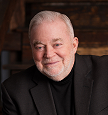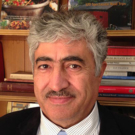Speakers

Alison Glick
Director of Development and Mobilization
Churches for Middle East Peace

James E. Wallis
Founder, President, and Editor-In-Chief
Sojourners
Event Summary
On November 14, 2019, Arab Center Washington DC (ACW) hosted a panel discussion at its headquarters titled “Evangelical Christians and US Middle East Policy.” The speakers were Alison Glick, Director of Development and Mobilization with Churches for Middle East Peace, James Wallis, theologian, best-selling author, and founder and editor-in-chief of Sojourners Magazine, and Jonathan Kuttab, ACW non-resident fellow and human rights lawyer, who also moderated the discussion.
Kuttab stated that as there are differences among American evangelicals with regards to Israel and Palestine, and there are differences within the American Jewish community in the United States. He asserted that the issue with evangelicals dealing with the Middle East is specifically the unconditional support of Israel by Christian Zionists. He identified the latter as those Christians who believe that what is happening in the Middle East is a fulfillment of a prophecy about the advent of Christ. One seminal event during the Trump presidency that saw the involvement of Christian Zionists in foreign policy was moving the US embassy in Israel to Jerusalem despite the illegality of the act. As representatives of the Evangelical Christian community, Vice President Mike Pence and Secretary of State Mike Pompeo played a major role and were the forces behind the endeavor, which gave the move more publicity and exposure among this group. He cautioned against neglecting the evangelical community and advocated openness with it because that is the only way of effecting change in the community.
Glick said that the number of evangelicals in the United States is about 100 million, which is 25-30 percent of the US adult population, which makes them the largest religious community in the country. While they overwhelmingly are conservative, not all of them have the same position regarding the Middle East. She stated that the evangelical community is experiencing some changes today. Many of the young are leaving the group because they differ from their parents on climate and social issues. Many new adherents to evangelical doctrine also are from minorities in the United States who espouse a less conservative ideology. Glick focused on evangelical support for Israel, saying that 77 percent of adults 65 and older “support the existence, security and prosperity of Israel” as compared to 58 percent of young evangelicals (those 18-34 years old). Forty-nine percent of older evangelicals disagree that Israel has been unfair to Palestinians while only 32 percent of the young disagree. She stated that evangelicals who go on tours to the West Bank do not see the reality there and advocated more “contextualized” tours so that adherents can see how Israel really treats Palestinians.
Wallis disputed the claim that evangelicals take religion seriously, saying that they are political. He used the 2016 election as an example when the evangelical community supported Donald Trump. He cautioned that today’s political and social atmosphere is very dangerous, stating that “we are being led to an American brand of fascism and most White Christians are supporting it.” He berated White nationalism as “not just racist,” but specifically “anti-Christ.” He said that the way to salvation is to reclaim the original Jesus and his teachings which centered on helping the poor. Wallis stated that currently there is no hope that Congress will change how it looks at Israel and Palestine but asserted that things are changing. He said that when Christians in the United States recognize that Palestinians have rights, then there will be change, asserting that the recognition of people’s humanity is the first step of recognizing rights. “When Christians get to the Middle East,” he stated, “they have a life-changing experience. That is an experience that people need to go through.”
Speaker Bios
Alison Glick is the Director of Development and Mobilization at Churches for Middle East Peace. She lived and worked for six years in the Middle East, including three years in the West Bank and Gaza Strip and three years in Yarmouk Camp near Damascus, Syria. In Palestine, she taught at the Quaker-run Friends Schools in Ramallah and worked as a human rights researcher for an NGO in Gaza City during the first Palestinian Intifada. More recently, Alison served as Assistant Director of Georgetown University’s Center for Contemporary Arab Studies and as international program officer for a whistleblower support and advocacy organization, where she helped build an international network of anti-corruption and transparency advocates. She graduated Summa Cum Laude from Temple University with a bachelor’s degree in Middle East history, and has been working for justice, equality and dignity for all in Israel/Palestine for many years.
Jonathan Kuttab is a Palestinian human rights lawyer and peace activist. He is the co-founder of the human rights organizations Al Haq, the West Bank affiliate of the International Commission of Jurists; the Mandela Institute for Political Prisoners, a Palestinian human rights organization focusing its efforts on the plight of political prisoners, and the Jerusalem-based Palestinian Center for the Study of Nonviolence. He is also a board member of the Sabeel Ecumenical Liberation Theology Center in Jerusalem. Kuttab was raised in Jerusalem and Bethlehem. After the Six Day War, his family moved to the United States, where he graduated from Messiah College and earned his law degree from the University of Virginia. Licensed to practice law in Palestine, Israel, and New York, Kuttab worked with a Wall Street law firm for several years.
James E. Wallis is a globally respected writer, teacher, preacher, and justice advocate who believes the gospel of Jesus must be transformed from its cultural and political captivities. He is a New York Times bestselling author, widely recognized public theologian, renowned speaker, and regular international commentator on ethics and public life. He is the Founder, President, and Editor-In-Chief of Sojourners, and is the author of 12 books, including American’s Original Sin, God’s Politics, The Great Awakening, and The Call to Conversion. He served on President Obama’s White House Advisory Council on Faith-based and Neighborhood Partnerships and has taught faith and public life courses at Harvard and Georgetown University. “Coach Jim” also served for 22 seasons as a Little League coach for his two baseball playing sons.
Event Photos

